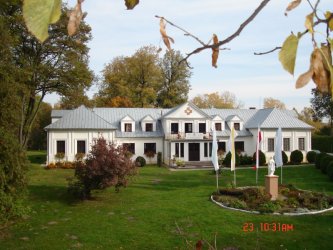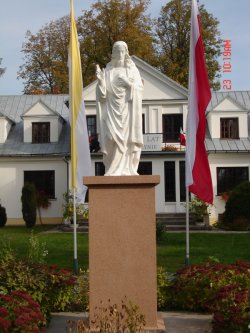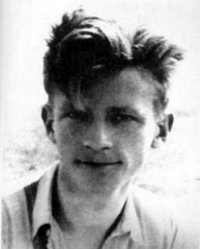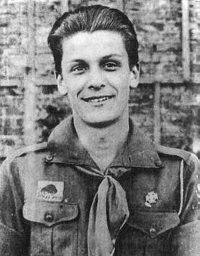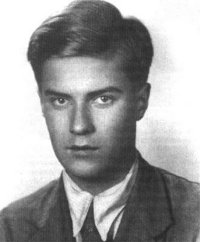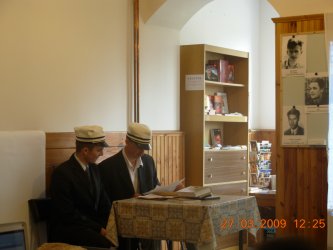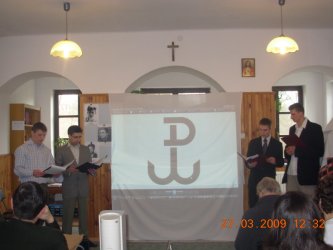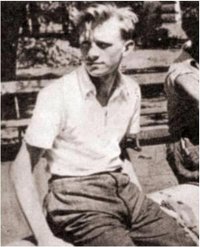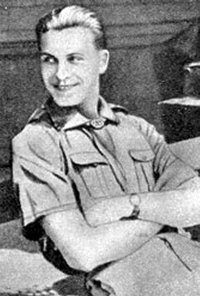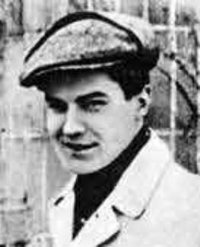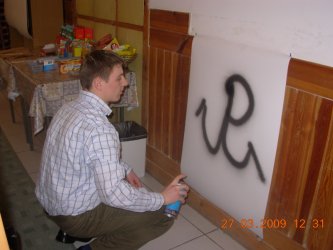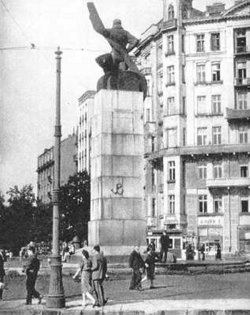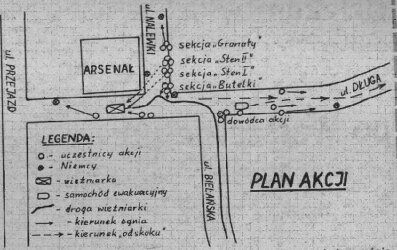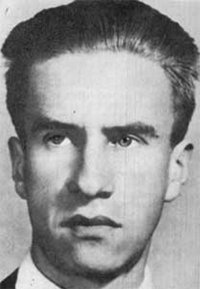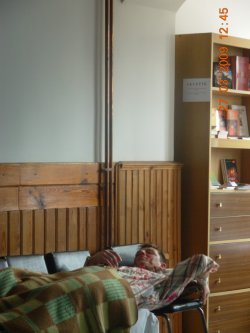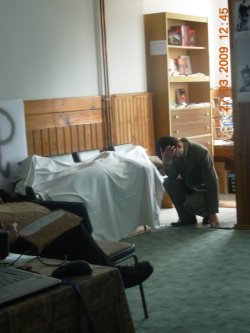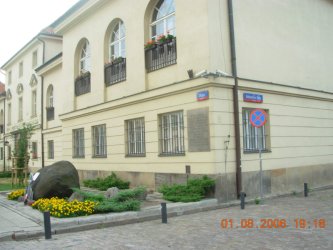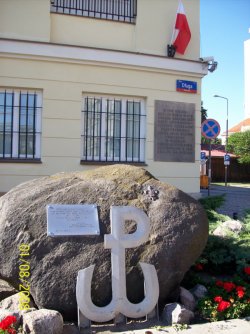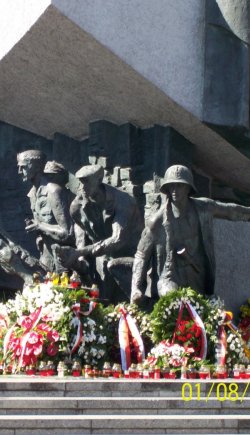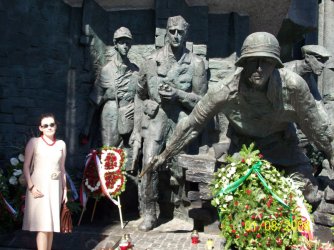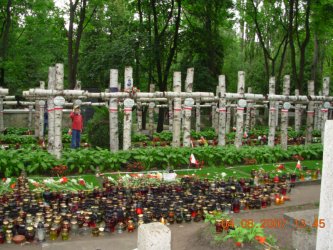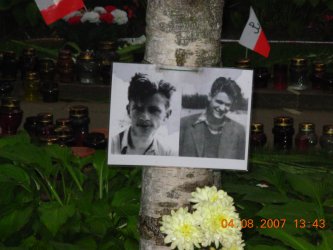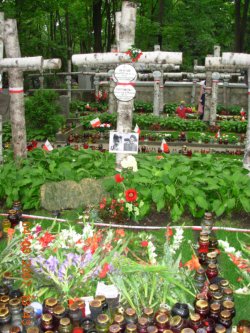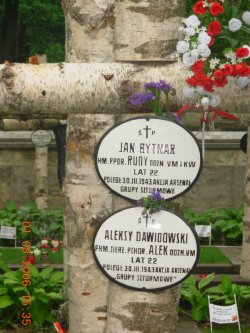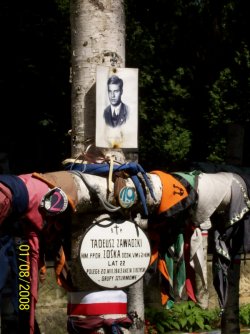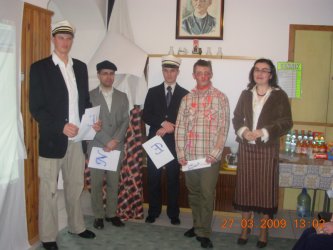Details of the action are to be gained from a report by Stanisław Sieradzki a.k.a. "Świst" entitled "The scouting fate" which is on our website.
While solemn ceremonies were being performed in Warsaw, including a scouting parade, street games and meetings with veterans, other initiatives connected with the 66th anniversary of the Arsenal Action were happening in other Polish cities.
One of such places is situated not far away from Lublin. Pliszczyn is a charming town on the Lublin Upland, 10 kilometers in the north-east direction from Lublin. In the centre of Pliszczyn there is the Sacred Heart Priests' Monastery.
Every year candidates to the monastic life come here and the time spent in Pliszczyn is the first step of their monastic formation. Both their tutors and lecturers accompany these young men in spiritual and intellectual growing up. Young students come from different parts of Poland and some - even from other countries.
A group of young people in Pliszczyn decided to commemorate the Arsenal Action's anniversary by their own. Their aim was to remind other people of their peers' living in the 1940s heroism as well as to give prominence to features like: patriotism, loyalty towards friends, courage and honesty.
March 27, 2009 was being long awaited for in Pliszczyn The postulate students, having flushed, were preparing themselves for the metamorphosis. At the end of March 2009 they were to move into another reality, into the difficult times of the occupation, from the peaceful Pliszczyn to the dangerous war Warsaw...
A script of the presentation was prepared by Monika Ałasa, their teacher of English and an active member of the 1944 Warsaw Uprising Remembrance Association. The roles were being performed by four young people: Evgheni (Żenia) Bordeianu from Moldova, Józef Rychtarczyk from Groń in the Tatras mountains, Adam Insadowski from Susz in the north-eastern Poland (Mazury) and Michał Tomaka from Rzeszów.
The idea of the presentation seems to be very unique. The text is being uttered in the English language which is followed at once by the Polish language. Lines in the Russian language appear from time to time, as well.
Who was Rudy?
A three-language-presentation performed by means of a word and music
Starring:
Rudy - Żenia
Alek (Student I i Narrator II) - Józek
Zośka - Adam
Narrator (and Student II) - Michał
Lines uttered by Narrators are varied by quotations, fragments of poems, songs, scenes, picture shows, etc.
Stage design: 3 portraits, 3 dates:
Jan Bytnar "Rudy" (6 May 1921 - 30 March 1943)
Maciej Aleksy Dawidowski "Alek" (3 November 1920 - 30 March 1943)
Tadeusz Zawadzki "Zośka" (24 January 1921 - 20 August 1943)
SCENE I
(students are sitting in a school desk)
Student I (depressed): No! I don't know the answer! What has she invented?
Nie! Nie znam odpowiedzi! Co ona wymyśliła?
Student II: Who are you talking about? What's the problem?
O kim mówisz? Co się stało?
Student I (irritated): Our teacher, Miss Monika, gave us another surprise homework! But it doesn't make any sense!
Nasza nauczycielka, p. Monika, zadała nam pracę domową, kolejną niespodziankę. Ale to nie ma sensu!
Student II: Come on! It must be OK.
Dajże spokój! Na pewno wszystko jest w porządku.
Student I: Are you so clever? So tell me: Who was Rudy? I know that Rudy is a colour, I know that you can be red-haired but WHO was some Rudy?
Taki mądry jesteś? To powiedz mi: Kim był Rudy? Wiem przecież, że jest taki kolor rudy, wiem, ze można mieć rude włosy, ale KIM był jakiś Rudy?
(the school desk is being hidden behind the curtain)
Narrator: Some time ago our teacher did a survey. She asked a group of 30 people and here are the most common answers:
Jakiś czas temu nasza nauczycielka przeprowadziła ankietę. Zadała pytanie 30-tu osobom a oto najbardziej reprezentatywne odpowiedzi:
voices coming from a microcassette recorder:
p: Excuse me, could you be so kind and answer one question?
o: Yes, go on
p: Who was Rudy?
o: Hmmm,..., well... Rudy is a Warsaw Uprising hero...
p: Thank you for your answer.
p: Good morning. Could you answer one question, please?
o: What a question?
p: Who was Rudy?
o: Rudy? It's a tank in "Czterej pancerni"!
p: Thank you...
p: Excuse me, who was Rudy?
o: Rudy... Rudy... Well, I don't know who Rudy was, but I know that for example Michał Bajor is red-haired. (Michał Bajor - a famous Polish singer and actor)
p: Thank you for your answer
p: Good morning, Would you be so kind and answer my question?
o: Yes, of course.
p: Who was Rudy?
o: A tank!
(In a well-known Polish TV series from 1970s entitled "Czterej pancerni i pies" one can watch a T-34 tank called "Rudy" operated by a Polish crew.)
CD: fragment of a song "Do you know?" by Enrique Iglesias
Narrator: Do YOU know? That's the question!
Czy Państwo wiedzą? Oto jest pytanie!
CD:
(everybody is singing the Anthem of the Polish Underground State)
Naprzód, do boju żołnierze
Polski Podziemnej! Za broń!
Boska potęga nas strzeże,
Woła do boju Was dzwon.
Godzina pomsty wybija,
Za zbrodnię, mękę i krew.
Do broni! Jezus Maryja!
Żołnierski woła nas zew.
Zorza wolności się pali
Nad Polską idących lat.
Moc nasza przemoc powali,
Nowy dziś rodzi się świat.
Godzina pomsty wybija,
Za zbrodnię, mękę i krew.
Do broni! Jezus Maryja!
Żołnierski woła nas zew.
Za naszą wolność i waszą
Bracia, chwytajmy za miecz,
Śmierć ani trud nas nie straszą,
Zwycięski orle nasz leć.
Godzina pomsty wybija,
Za zbrodnię, mękę i krew.
Do broni! Jezus Maryja!
Żołnierski woła nas zew.
Narrator: This was a song of the Polish Underground State.
Był to hymn Polskiego Państwa Podziemnego.
Rudy was one of his numerous soldiers.
Rudy był jednym z jego licznych żołnierzy.
(he wants to go on but Narrator II is interrupting him):
Narrator II: "Verba docent, exempla trahunt!"
Adam: "A good example is the best sermon!"
Żenia: "Premier łutsze nastawlienija!"
Józek: "Słowa uczą, przykłady pociągają!"
Narrator: Oh, yes! So let's listen about Rudy!
O tak! Posłuchajmy zatem opowieści o Rudym!
Narrator II: And about his friends!
I o jego przyjaciołach!
CD: two songs: "Deszcz jesienny" and "Dziś do ciebie przyjść nie mogę"
(everybody is present, singing)
Deszcz jesienny
Deszcz, jesienny deszcz
Smutne pieśni gra.
Mokną na nim karabiny,
Hełmy kryje rdza. /bis
Nieś po rosie w dal,
W zapłakany świat
Przemoczone pod plecakiem
Osiemnaście lat. /bis
Deszcz, jesienny deszcz
Bębni w hełmu stal.
Idziesz, młody żołnierzyku,
Gdzieś w nieznaną dal. /bis
Może jednak Bóg
Da, że wrócisz znów.
Będziesz tulił jasną główkę
Miłej swej do snu. /bis
Deszcz, jesienny deszcz
Smutne pieśni gra.
Mokną na nim karabiny,
Hełmy kryje rdza. /bis
Nieś po rosie w dal,
W zapłakany świat
Przemoczone pod plecakiem
Osiemnaście lat.
Dziś do ciebie przyjść nie mogę
Dziś do ciebie przyjść nie mogę,
Zaraz idę w nocy mrok,
Nie wyglądaj za mną oknem,
W mgle utonie próżno wzrok.
Po cóż ci, kochanie, wiedzieć,
Że do lasu idę spać.
Dłużej tu nie mogę siedzieć,
Na mnie czeka leśna brać.
Dłużej tu nie mogę siedzieć,
Na mnie czeka leśna brać.
Księżyc zaszedł hen, za lasem,
We wsi gdzieś szczekają psy,
A nie pomyśl sobie czasem,
Że do innej tęskno mi.
Kiedy wrócę znów do ciebie,
Może w dzień, a może w noc,
Dobrze będzie nam jak w niebie,
Pocałunków dasz mi moc,
Dobrze będzie nam jak w niebie,
Pocałunków dasz mi moc.
Gdy nie wrócę, niechaj z wiosną
Rolę moją sieje brat.
Kości moje mchem porosną
I użyźnią ziemi szmat.
W pole wyjdź pewnego ranka,
Na snop żyta dłonie złóż
I ucałuj jak kochanka,
Ja żyć będę w kłosach zbóż.
I ucałuj jak kochanka,
Ja żyć będę w kłosach zbóż.
Narrator: The Second World War... Those were cruel times... Full of pain, death and tears...
II wojna światowa... Okrutne były to czasy... Pełne cierpienia, śmierci i łez...
Narrator II: But young people did not lose their energy, optimism and fighting spirit!
Lecz młodzi ludzie nie stracili swej energii, optymizmu i ducha walki!
CD: fragment of a song "Zośka" (as a background)
Szare hełmy błyszczą stalą,
Rytm podkutych nóg.
Twardo dudni bruk,
Hej niech zmyka wróg!
To szturmowcy drogą walą,
Śpiewa chłopców chór,
W cekaem-ów i peem-ów wtór,
Do boju!
Zośko, Zosiu, hej Zosieńko!
Maszerować chodź panienko,
Przecież idziem w bój,
W tan przy świście kul,
Seryjką z peemu
W rytm tego refrenu
Wybijaj takt!
Cóż, że czasem kula draśnie,
Cóż, że tryśnie krew,
Brzmi szturmowy śpiew,
Nasz bojowy zew!
A gdy który śmiercią zaśnie,
To przyjemnych snów!
Jutro może się spotkamy znów,
Kolego!
Zośko, Zosiu, hej Zosieńko!
Łezkę z oka otrzyj ręką,
Chociaż może padł
Ten co serce skradł.
Szturmowa to dola -
Śmierć, nigdy niewola,
Ge-eSa los!
Hej Zosieńko, hej panienko!
Na cóż próżne łzy?
Wszakże z naszej krwi
Wolne wstaną dni.
I wdziejemy znów z piosenką
Panterkowy strój.
I z zabawą, chociaż krwawą, w bój
Kochanie!
Zośko, Zosiu, hej Zosieńko,
Weźmy wszyscy się pod rękę
W te radosne dni!
Maj bzem będzie kwitł.
Pójdziemy łanami
Tkanymi chabrami
Ty, ja i my!
SCENE II
Student I: (sighing) Zośka... Zosieńka... What a nice name! Was she a pretty girl?
Zośka, co za piękne imię! Ładna to była dziewczyna?
Student II: What a fool! Zośka was a pseudonym of one of the Grey Regiments' members, Tadeusz Zawadzki. He was the best friend of Rudy.
Głupcze! Zośka to pseudonim jednego z członków Szarych Szeregów, Tadeusza Zawadzkiego. Był on najlepszym przyjacielem Rudego.
Student I: Oh, I see! You are so clever! Tell me, was Rudy red-haired?
A! Rozumiem! Jesteś taki mądry! Powiedz, czy Rudy był naprawdę rudy?
Student II: Just look.
Zobacz sam.
(they are having a look at photographs of Rudy, Alek and Zośka on a notebook)
Student I: (pointing at a picture of Alek) And who is this?
A to kto?
Student II: This is Maciej Aleksy Dawidowski a.k.a. Alek.
To jest Maciej Aleksy Dawidowski, znany jako Alek.
(he is showing the following books: "Kamienie na szaniec" by Aleksander Kamiński, "Bohaterowie 'Kamieni na szaniec' w świetle dokumentów" by Tomasz Strzembosz,
"Rudy, Alek, Zośka" by B. Wachowicz as well as a film "Akcja pod Arsenałem" on both DVD and VHS):
You can read about Rudy and the times in which he lived in these books.
Z tych książek możesz dowiedzieć się o Rudym i czasach, w jakich żył.
Student I: Thanks but don't you have any films?
Dzięki, ale czy nie masz jakichś filmów?
Student II: There is a film not to be missed, as our teacher says, "The Arsenal Action" directed by Jan Łomnicki.
Jest film, którego nie można przegapić, jak mówi nasza nauczycielka. "Akcja pod Arsenałem" w reżyserii Jana Łomnickiego.
(a school desk is disappearing behind a curtain; 3 boys are running into the scene,
kicking a ball and laughing)
SCENE III
Rudy: It's so good to be with you, my friends!
Dobrze być z wami, przyjaciele!
Alek: It's a pity we must go in a while. (to Rudy): It's a meeting at 4 p.m. you said, didn't you, Rudy?
Szkoda, ze musimy za chwilę iść. (to Rudy): O czwartej zebranie, sam mówiłeś?
Rudy: Yes, we must plan another actions of the Little Sabotage. (he's holding a flag with a sign of an anchor on) The Warsaw people need more signs and scriptures on walls. More Polish flags, more action. This make them stronger.
Tak, musimy zaplanować kolejne akcje w ramach Małego Sabotażu. Warszawiacy potrzebują więcej napisów na murach, więcej polskich flag, więcej naszego działania. To czyni ich silniejszymi.
Zośka: That's right. Rudy, what would we do without your eagerness? Let's go!
Prawda. Rudy, co my byśmy zrobili bez Twojego zapału? Chodźmy!
Rudy: (saluting): Yes, sir!
Tak jest!
(they are running out, laughing)
(a while after that they are coming back and painting anchors on white cardboards on a room's walls)
Picture from a notebook: the Lublin Union Square - an aviator's monument
(they are coming forward and reciting):
W świt wolności zapatrzeni
Idziemy - śmiało stawiając nasz krok
Garść na szaniec rzuconych kamieni
Aby rozjaśnić mrok, niewoli mrok!
To "Zośki" wiara, harcerska brać
Tyś ich Warszawo powinna znać
Bo krew Ich wsiąkła w twoich ulic bruk
I snem Ich wiecznym w twoich gruzach złożył Bóg...
To "Zośki" wiara, harcerska brać
To "Alki", "Felki", "Maciek" i "SAD"
Co w bój ruszali jak gdyby w tan
Zwycięski huf Harcerskich
Grup Szturmowych stan!
To "Zośki" wiara, harcerski huf
Na gruzach złożył skronie do snu
Potrafił umrzeć jak umiał się bić...
Lecz duch nie zginął!
W nas pozostał - aby żyć!
(two last lines should be said with emphasis!)
SCENE IV
Zośka: Do you know what I am most afraid of? I wouldn't like to die, you know, at the Gestapo, like an animal that is hunted down. I want to die with dignity.
Wiesz czego boję się najbardziej? Ja nie chciałbym umierać tak, no wiesz, u nich na gestapo, jak zaszczute zwierzę. Jeżeli już to w walce, jak człowiek, z godnością.
Rudy: It's no matter how you die. You would like to give your death some meaning. A new Messiah of the Polish Secret Underground State! You are vain.
Czy to nie wszystko jedno jak się umiera? Chciałbyś nadać swojej śmierci jakieś znaczenie. Nowy Mesjasz Polski Podziemnej! Próżny jesteś.
Zośka: You fool! I just want to die with sense!
Ty głupi! Ja po prostu chcę umierać z sensem!
Rudy: With sense... You think that your unusual death will move somebody, yes? It will be an example for the future generations? Who will care how we were dying?
Z sensem... I myślisz, ze to Twoje nadzwyczajne zejście kogoś poruszy, tak? Będzie przykładem dla przyszłych pokoleń? Kogo to będzie obchodziło, jak umieraliśmy?
Narrator: Despite pessimistic expectations of Rudy, there were and there are people who care...
Pomimo pesymistycznych przypuszczeń Rudego, byli i są ludzie, których to obchodzi...
Narrator II: March 23, 1943 came...
Nadszedł dzień 23 marca roku 1943...
SCENE V
(Zośka is sitting in a room and his terrified friend is dashing in):
Narrator II: Rudy has been arrested! They have him!
Rudy aresztowany! Mają go!
Zośka (ze łzami): They hit us. In the middle of the heart.
Trafili nas. W samo serce.
Narrator: Janek Bytnar was arrested by the Gestapo during the night of the 22nd and 23rd March 1943.
Janek Bytnar został aresztowany przez Gestapo w nocy z 22 na 23 marca 1943 roku.
Since then only one thought occupied their minds.
Odtąd tylko jedna myśl zajmowała ich umysły.
Zośka: We can save Rudy. We have to save him!
Możemy odbić Rudego. Musimy go odbić!
Narrator III: Due to their determination and devotion, the carefully planned action was successful. On March 26, 1943, in the area of Arsenal in Warsaw, Zośka, Alek and their friends commanded by Stanisław Broniewski ('Orsza') delivered Rudy and 24 other prisoners from death. They were being transported in a German prisoner car.
picture of the Action's plan
picture of "Orsza"
Dzięki swej determinacji i poświęceniu, dokładnie zaplanowana akcja zakończyła się sukcesem. 26 marca 1943 roku w rejonie warszawskiego Arsenału Zośka, Alek i ich koledzy dowodzeni przez Stanisława Broniewskiego "Orszę", ocalili Rudego i 24 innych ludzi transportowanych w niemieckiej więźniarce.
(Zośka is bringing blankets and cushions in order to prepare a comfortable place for Rudy)
SCENE VI
(Rudy is lying in a bed having bandages on his forehead and hands, wearing a torn shirt which is covered with his blood; Zośka is next to him, holding his hand)
Rudy: How nice! Can it be more pleasant?
Jak dobrze! Czy może być przyjemniej?
Zośka: Don't say anything. You must rest.
Nie mów nic. Musisz odpoczywać.
Rudy (hissing due to terrible pain): Zośka, I didn't think you would do it. But there... I dreamt only to see my friends, to see you...
Zośka, nie sądziłem, że to zrobicie. Ale tam... marzyłem tylko o tym, aby zobaczyć moich przyjaciół, aby zobaczyć Ciebie...
Narrator: Incredibly tortured, Janek suffered enormously and was weak.
Ogromnie skatowany, Janek cierpiał okrutnie i był słaby.
SCENE VII
(a fragment of a poem "My Testament" by Juliusz Słowacki is being read out)
Michał: But I beg you
Wszyscy: Let the living not lose hope ever
And bear the torch of learning before their compatriots;
And when called, go to their death one after another,
Like the stones tossed by the Lord onto the ramparts...
Michał: Lecz zaklinam
Wszyscy: Niech żywi nie tracą nadziei
I przed narodem niosą oświaty kaganiec;
A kiedy trzeba, na śmierć idą po kolei,
Jak kamienie przez Boga rzucane na szaniec!...
(Alek is entering, sitting on a chair while holding his stomach that is in bandages; one of his friends is nearby)
Alek (is giving a small paper to his friend): Please, read this aloud.
Przeczytaj głośno, proszę.
Narrator: He who dwells in the shelter of the Most High
Will abide in the shadow of the Almighty.
I will say to the Lord, "My refuge and my fortress,
My God, in whom I trust!"
(Psalm 91)
(all boys are singing like a psalm):
Kto się w opiekę odda Panu swemu
A całym sercem szczerze ufa Jemu
Śmiele rzec może: Mam obrońcę Boga
Nie przyjdzie na mnie żadna straszna trwoga!
(on the left there is Rudy with Zośka next to him; on the right there is Alek together with Narrator)
(after a moment of silence):
CD: a song "Santa Maria" by Kelly Family
(Zośka and Narrator are singing)
(Alek writhing in pain, holding his stomach; Rudy - weaker and weaker - is dying)
To the sky
To the mountain
To the river
To the valley
To my hometown
To my country
To the place where I was born
To my mother
To my father
To my sisters
And my brothers
To my friends and myself
And to those I love so well
Santa Maria
Prega per noi
Santa Maria
Prega per noi
To the world
And the people
In their crisis
In their pains
For the children of tomorrow
For the wars that never end
Santa Maria...
To the sky
To the mountain
To the river
To the valley
To my hometown
To my country
To the place where I was born
To the heroes
That we need today
To the lonely
With no one to cry
To the mothers
This source of life
To this world in so much pain
Santa Maria...
(When the song is coming to an end, Zośka and Narrator are bringing white sheets; I'm turning off the lights, and they are covering Rudy and Alek, accordingly, as a sign of their death...)
(after a while: everybody is leaving; then Narrator and Narrator II are entering)
Narrator: Tadeusz a.k.a. Zośka, had to cope with the death of his two closest friends. Rudy and Alek died on the same day: March 30, 1943.
Tadeusz "Zośka" musiał przeżyć śmierć swych dwóch najbliższych przyjaciół. Rudy i Alek umarli tego samego dnia: 30 marca 1943 roku.
Narrator II: Everyone who looked at Zośka felt sorry for him. Those who lost their closest friends could understand this young man who 'did more than he was able to.'
Każdy kto patrzył na Zośkę, współczuł mu. Jedynie ci, którzy stracili swych przyjaciół, mogli zrozumieć tego chłopca, który 'zrobił więcej niż mógł.'
Narrator: Zośka lived no more than five months longer. He died on August 20 during the AS action, fighting.
Zośka żył jedynie 5 miesięcy dłużej. Poległ 20 sierpnia, walcząc w czasie Akcji Sieczychy.
Pictures of Arsenal
Narrator II (pointing at a screen): These are the photographs of contemporary Warsaw. The Arsenal Action place in the Długa street, nearby the Bank Square and the Krasiński Square with the Warsaw Uprising monument.
A oto zdjęcia współczesnej Warszawy. Miejsce Akcji pod Arsenałem przy ul. Długiej, w pobliżu Placu Bankowego i Placu Krasińskich z pomnikiem Powstania Warszawskiego.
CD: "Piosenka o mojej Warszawie"
(simultaneously pictures of the contemporary Warsaw are being shown on an overhead projector)
Piosenka o mojej Warszawie
Warszawo, kochana Warszawo!
Tyś treścią mych marzeń i snów, radosnych przechodniów Twych lawą,
ulicznym rozgwarem i wrzawą.
Ty wołasz mnie, wołasz stęskniona
upojnych piosenek i słów. jak bardzo dziś pragnę zobaczyć Cię znów.
O, moja Warszawo wyśniona. jak pragnąłbym krokiem beztroskim
przemierzyć przestrzeni twej szmat.
Bez celu się przejść Marszałkowską,
na Wisłę napatrzeć się z mostu.
Dziewiątką pojechać w Aleje,
Krakowskim się wpleść w Nowy Świat.
I ujrzeć jak dawniej, za młodych mych lat,
jak do mnie, Warszawo, się śmiejesz.
Ja wiem, żeś Ty dzisiaj nie taka, że krwawe przeżywasz dziś dni,
że rozpacz, że ból Cię przygniata, że muszę nad Tobą zapłakać.
Lecz taką jak żyjesz w pamięci
przywrócę ofiarą mej krwi.
wierz mi, Warszawo, prócz piosnki i łzy
jam gotów Ci życie poświęcić!
Narrator: Yes, indeed! Rudy and his friends saved their lives for their Homeland, for their City, for their compatriots.
Zaiste, Rudy i jego przyjaciele poświęcili życie dla swej Ojczyzny, dla swego Miasta, dla swych rodaków.
Narrator II: When you are in Warsaw at the Krasiński Square you can take a bus number 22 and go to the Powązki Military Cemetery.
Będąc w Warszawie, gdy wsiądziesz przy Placu Krasińskich w autobus numer 22, dojedziesz na Powązkowski Cmentarz Wojskowy.
Pictures of the Powązki Military Cemetery
Narrator: Why should I be there?, you may ask.
Dlaczego powinienem tam być?, zapytasz.
Narrator II: Mrs. Janina Kowalska states, "Graves are also on duty - they teach history - our wonderful and proud Polish history."
"Groby też pełnią służbę - uczą historii - naszej pięknej i dumnej polskiej historii."
Then she adds, "I have a feeling that They in the graves also serve for Tomorrow."
Mam takie wrażenie, że Oni tam w grobach też sprawują Służbę dla Jutra.
(after a while)
Narrator: The second step after REMEMBERING is TO BE. Also at the graves of our national heroes.
Kolejnym krokiem oprócz PAMIĘCI jest OBECNOŚĆ. Również przy grobach naszych narodowych bohaterów.
"Where are their graves, Poland! Where are they not!"
"Gdzie są ich groby, Polsko! gdzie ich nie ma!"
Narrator II: How true are the words of a poem "Prayer for the dead" by Artur Oppman! These words were uttered by the Pope John Paul II during his homily in Warsaw in 1979.
Jakże prawdziwe są słowa wiersza "Pacierz za zmarłych" Artura Oppmana! Słowa te wypowiedział Papież Jan Paweł II w czasie swej homilii w Warszawie w roku 1979.
Narrator: The third step is TO ACT.'Action' always sounds as the most difficult. However, one can start with displaying a national flag on important anniversaries.
Trzecim krokiem jest DZIAŁAĆ. "Działanie" zawsze wydaje się najtrudniejsze. Jednakże, można zacząć od wywieszania flagi narodowej z okazji ważnych rocznic.
Another sign of patriotism is as simple as that: to stop for a while at 5 p.m. on 1 August, maybe at 5.30 p.m. on 26 March, as well... Once you are a scout, you can participate in Rajd Arsenał, which is, above all, a manifestation of the memory about the participants of the Arsenal Action.
Inną oznaką patriotyzmu jest zatrzymać się na chwilę o godzinie 17.00 1-go sierpnia, a może o 17.30 26-go marca również... Jeśli jesteś harcerzem, możesz brać udział w Rajdzie Arsenał, który jest, przede wszystkim, manifestacją pamięci o uczestnikach Akcji pod Arsenałem.
Narrator II: Last but not least, it is worth being at the ceremonies in Warsaw. Such small gestures shape our national and personal identity.
W końcu, warto uczestniczyć w uroczystościach w Warszawie. Takie małe gesty kształtują naszą narodową i osobistą tożsamość.
SCENE VIII
Student I: Now I understand! You should remember, be and act in order to live better.
Teraz rozumiem! Powinieneś pamiętać, być i działać, aby żyć piękniej.
Student II: That's true!! While following the examples of Rudy and Zośka, we will learn how to live.
To prawda!! Podążając za przykładem Rudego czy Zośki nauczymy się, jak żyć.
(Everybody together): You just have to want.
Trzeba tylko chcieć.
Student I: I wish I had such faithful friends as Rudy did.
Chciałbym mieć takich wiernych przyjaciół jak miał Rudy.
(Everybody together): "A friend in need is a friend indeed."
"Prawdziwych przyjaciół poznajemy w biedzie".
Żenia: "Drug paznajotsa w biedie".
Narrator: I hope the results of the survey which our Miss Monika did will never be the same again!
Mam nadzieję, że nie powtórzą się już nigdy wyniki ankiety, jaką przeprowadziła nasza p. Monika!
And the answers will be only such as this:
A odpowiedzi respondentów będą tylko takie jak ta:
voice from a microcassette recorder:
p: Excuse me, could you answer my question, please?
o: All right.
p: So please, answer this: who was Rudy?
o: Rudy is a main character of a book entitled "Kamienie na szaniec". He is one of the three boys, the main characters.
p: A very good answer, thank you!
(Everybody together): We know who Rudy was!! Please, remember, as well!!
My wiemy, kim był Rudy!! Prosimy zapamiętać!!
Student I is bringing his teacher an essay about Rudy.
The teacher is giving him a big red 5 (i.e. A mark).
Everybody is bowing.
THE END
The audience reacted to this over one hour-long-presentation by showing great interest and emotion. The performance "Who was Rudy" evoked guests' tears of emotion, reflection but also laughter and admiration. The script's author felt double happiness - not only did she highly evaluate language (English, Polish and Russian) abilities of her students, but she also made sure that the boys really knew who Rudy had been and would propagate this knowledge. One ought to hope that such activities will disallow the results of a survey done by the teacher in her student years, which were quoted at the beginning of the presentation, to happen again.
What was emphasized in the performance was the atmosphere of the youth environment at the war time in Warsaw, especially their being devoted in preparing actions of the Little Sabotage and their willingness to sacrifice their abilities, knowledge, even their own life for the Cause. For future generations these young heroes are great examples of what a man is able to do if they think highly of values like: friendship, love or brotherhood...
Alike initiatives will help to become familiarized with fascinating biographies of Rudy, Alek, Zośka and their friends. They can make young people living in the 21st century be it in Pliszczyn, Lublin, Warsaw, Cracow or wherever else in the world put Their life values into effect! Indeed, while following the examples of Rudy and Zośka, we will learn how to live. "You just have to want!"
Friar Chancellor from Pliszczyn, Fr. Jan Strzałka SCJ, while thanking the script's author and the students-actors, expressed his joy that the event would be immortalized in a form of a photo report on the website of the 1944 Warsaw Uprising Remembrance Association. Thanks to that, the essence being propagated there will be available for the wider circle of readers.
